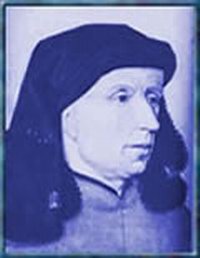In Celebration of the Human Voice - The Essential Musical Instrument
Home | Doo Wop | Barbershop | World | Contemporary | Christian | Vocal Jazz | Choral | Christmas | Instructional | Arrangements
Classical | Opera | Musicals | Personality | Young Singers | Disney | Videos | Songs | The Artists

Johannes Ockeghem Biography

Click Here for Sheet Music and Songbook Vocal Arrangements
Although often thought to be Flemish, Ockeghem was born in Saint-Ghislain, in the provence of Hainaut (now part of modern Belgium), part of the Duchy of Burgundy. Like many composers in this period, he started his musical career as chorister: in his case, in the Notre Dame in Antwerp. Around 1452 he moved to Paris where he served as maestro di cappella to the French court, as well as becoming treasurer of the St. Martin cathedral in Tours. Very few of his works have survived: some 14 masses, 10 motets, some 25 chansons, and a single requiem. This Missa pro Defunctis is the earliest surviving example of a polyphonic requiem mass. A strong influence on Josquin Des Prez, Ockeghem was famous throughout Europe for his expressive music and his technical mastery. His technical prowess is demonstrated most clearly in the astonishing Missa Prolationem, composed entirely in canonical style, and his no less astonishing 36(!) part canon Deo Gratias. - but even these technique-oriented masterpieces demonstrate his insightful use of vocal ranges and unique expressive tonal language. Being a renowned bass singer himself, certainly his use of complex bass lines sets him apart from the other composers in the Dutch Schools. To commemorate his death, Josquin Des Prez composed Nymphes des Bois on a poem by Molinet. |
Select a Category |
Want to Sing? - Find a Chorus Near You
List of Choruses by State | List of Choruses by City
